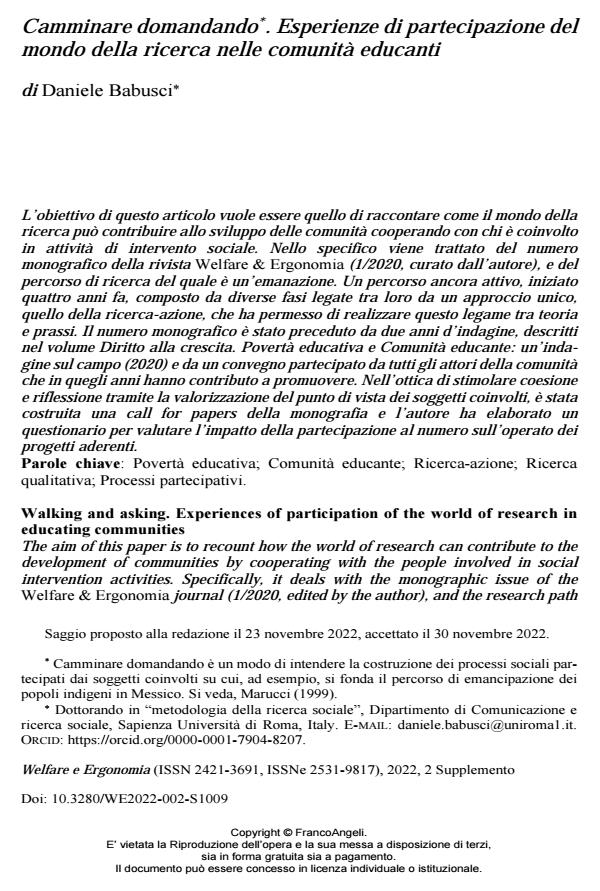Walking and asking. Experiences of participation of the world of research in educating communities
Journal title WELFARE E ERGONOMIA
Author/s Daniele Babusci
Publishing Year 2023 Issue 2022/2 Suppl.
Language Italian Pages 10 P. 101-110 File size 172 KB
DOI 10.3280/WE2022-002-S1009
DOI is like a bar code for intellectual property: to have more infomation
click here
Below, you can see the article first page
If you want to buy this article in PDF format, you can do it, following the instructions to buy download credits

FrancoAngeli is member of Publishers International Linking Association, Inc (PILA), a not-for-profit association which run the CrossRef service enabling links to and from online scholarly content.
The aim of this paper is to recount how the world of research can contribute to the development of communities by cooperating with the people involved in social intervention activities. Specifically, it deals with the monographic issue of the Welfare & Ergonomia journal (1/2020, edited by the author), and the research path of which it is an emanation. A path that is still active, which started four years ago, composed of different stages linked together by a single approach, that of action-research, which has made it possible to implement this link between theory and practice. The monographic issue was preceded by two years of investigation, described in the volume The Right to Growth. Educational poverty and educating community: a field survey (2020) and a conference attended by all the actors of the community that they had contributed to promote in those years. In order to stimulate cohesion and reflection through the enhancement of the point of view of the subjects involved, a call for papers for the monograph has been drafted and the author has developed a questionnaire to evaluate the impact of participating to the journal issue on the projects involved.
Keywords: Educational poverty; Educating community; Action research; Qualitative research; Participatory processes.
- Babusci D., a cura di (2020). Povertà educativa e disuguaglianze sociali. Un confronto dalle comunità educanti. Welfare & Ergonomia, 1.
- Babusci D. e Ciocia A., a cura di (2020). Diritto alla crescita. Povertà educativa e comunità educante: un’indagine sul campo. Roma: Aracne editrice.
- Bagnasco A. (1992). Comunità. In: Enciclopedia delle scienze sociali.
- Batini F. e Bartolucci M. (2017). La valutazione per favorire la motivazione. Università di Perugia.
- Girelli C. e Bevilacqua A. (2018). Se “da soli non ce la fanno”. Come supportare le famiglie di bambini e ragazzi con fragilità educative. Annali online della Didattica e della Fondazione Docente, 10(15-16): 362-379.
- Lewin K. (1946). Action Research and Minority Problems. Social Issue, 2(4).
- Melucci A. (2010). Culture in Gioco. Differenze per Convivere. Milano: Ledizioni.
- Marucci A. (1999). Camminare domandando. La rivoluzione zapatista. Milano: Derive Approdi.
- Pozzi G. e Zappi L. (1993). La ricerca-azione. Metodi, strumenti, casi. Torino: Bollati Borghieri.
- Punziano A. (2006). I mixed methods nella ricerca sociale. Roma: Carocci.
- Save the Children (2018). Nuotare contro corrente. Povertà educativa e resilienza in Italia. Save The Children Roma.
- Save the Children (2014). La lampada di Aladino. L’indice di Save the Children per misurare le povertà educative e illuminare il futuro dei bambini in Italia. Save The Children Roma.
- Spoletti P. (2011). Educazione linguistica ed equità nel sistema di istruzione. In: AA. VV., La scuola disuguale. Dispersione scolastica ed equità nel sistema di istruzione e formazione. Roma: Anicia.
Daniele Babusci, Camminare domandando. Esperienze di partecipazione del mondo della ricerca nelle comunità educanti in "WELFARE E ERGONOMIA" 2 Suppl./2022, pp 101-110, DOI: 10.3280/WE2022-002-S1009